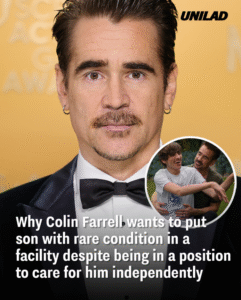Colin Farrell, the acclaimed Irish actor known for roles in films like The Banshees of Inisherin and In Bruges, has long been open about his personal life, especially when it comes to his eldest son, James, who was born with Angelman syndrome—a rare neuro-genetic disorder that affects speech, movement, balance, and development. Farrell’s decision to consider placing his son in a specialized care facility has sparked curiosity and, in some circles, debate. However, his reasoning is deeply rooted in love, long-term planning, and ensuring his son receives the best care possible.
Angelman syndrome is a lifelong condition that requires round-the-clock attention, therapy, and medical support. While Farrell has the financial means to provide at-home care, he’s made it clear that independence and proper resources for James are more important than appearances. Farrell has often spoken about how much he learns from his son’s joy and resilience, and how being James’s father has profoundly shaped him. But despite his devotion, Farrell acknowledges the reality of raising a child with significant special needs—a reality that includes considering the best path forward for James as he approaches adulthood.
In interviews, Farrell has expressed that placing James in a facility isn’t about relinquishing responsibility or stepping back as a parent. Instead, it’s about securing a consistent, structured environment where James can flourish with professionals who are trained specifically to support individuals with Angelman syndrome. These facilities often offer around-the-clock care, therapeutic programs, and community engagement tailored to the needs of their residents. Farrell’s choice reflects the understanding that sometimes, the most loving act a parent can make is to acknowledge when specialized help is necessary.
Another driving factor behind Farrell’s decision is future-proofing his son’s life. As any parent knows, no one is immortal. Farrell has openly said that one of his greatest fears is what will happen to James when he’s no longer around to care for him. By transitioning him into a facility while he’s still alive and active, Farrell ensures he can help James adjust, build relationships with caregivers, and get used to a new routine under his father’s guidance. This proactive step removes uncertainty for the future and gives James stability that doesn’t depend solely on Farrell’s presence.
Emotionally, the decision is anything but easy. Farrell has described it as “heart-wrenching,” but also a step toward ensuring his son’s dignity, autonomy, and quality of life. It’s a reminder that caregiving, especially for those with complex needs, involves tough choices that go beyond financial ability. In choosing a facility for James, Farrell is not stepping away—he’s stepping up in a different way. It’s about doing what’s right, not what’s easy.
Ultimately, Farrell’s move underscores a powerful message: love sometimes means letting go just enough to let someone grow and thrive with the support they need. In choosing what he believes is best for James, Colin Farrell is demonstrating the depth of a father’s devotion—not just for today, but for every tomorrow.
